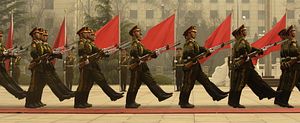In a bold move, the United States China Economic and Security Review Commission (USCC) has again demonstrated its ability to operate independently from the “China threat” thesis that has bedeviled its work since its creation in 2000. Last week, the USCC released a study undertaken by RAND at its request on China’s military weaknesses, a subject that it had all too often neglected in favor of over-hyped assessments of China’s potential threat and exaggerated narratives about the country’s military intentions. The RAND report, China’s Incomplete Military Transformation: Assessing the Weaknesses of the People’s Liberation Army (PLA), has been written by a group of authors whose collective expertise and balance is unassailable.
This report, though subject to the usual disclaimer about not representing the Commission’s view, represents a major evolution in U.S. understanding of the world in which it lives and presages a more informed debate in the United States about the development path on which China is traveling. It also should contribute to a reduction in hysteria in the United States about China’s military and national power.
Just two short citations from the RAND report are noted here to give some impression of its departure points. It says that a “better understanding of how the PLA itself sees these weaknesses and vulnerabilities is key to understanding its future modernization priorities; enhancing military-to-military engagement; [and] tailoring deterrence strategies.” The report goes on to say that “to accurately and completely assess PLA weaknesses, it is essential to understand the various missions assigned to the force and the potential threat environments in which these missions may be conducted.” These considerations have been all too absent in other public source studies.
Such questions are, one assumes, among the departure points of the Pentagon’s annual report to Congress on the military developments in the PRC. Yet in the 2014 Pentagon report, the word weakness does not seem to appear. The word “lack” appears only twice, and the word “shortcoming” appears only twice. But the PLA’s shortcomings are so profound, as the 200-page RAND report suggests, that they probably need a lot more attention in public than the Pentagon has been willing (or politically brave enough) to discuss or canvas objectively. For example, the Pentagon report notes that China “lacks the amphibious lift capacity that a large-scale invasion of Taiwan would require.” So surely that must affect the type of threat China represents to United States interests. That is a pretty big “weakness” on the only significant military confrontation dividing China and the United States.
The 2014 Pentagon report offers no significant assessment of China’s cyber military capability, cleverly substituting a description of China’s wish-list for cyber warfare. (It does offer some limited description of China’s cyber espionage capabilities.) As my colleague, Franz Gady, has observed, the recent RAND report from the USCC does offer a well informed and highly critical view of China’s cyber war capabilities. It says: “China also sees itself as potentially vulnerable in the electromagnetic spectrum. One area in which this concern has been particularly pronounced is Chinese concern about cybersecurity weaknesses. Indeed, the PLA clearly views itself as occupying a relatively disadvantageous position due to its perceived inferiority in the key aspects of ‘network military struggle.’” This is the view of most experts on this subject as summarized in my book, Cyber Policy in China. The book looks closely at Chinese leadership assessments of its industrial base in the ICT sector and the slow pace of reform of commercialization of university-based R&D.
The new RAND report on China’s weaknesses commissioned, to its enduring credit, by USCC, will become a much needed benchmark for all subsequent U.S. and international public debate on China’s power and its military intentions.

































